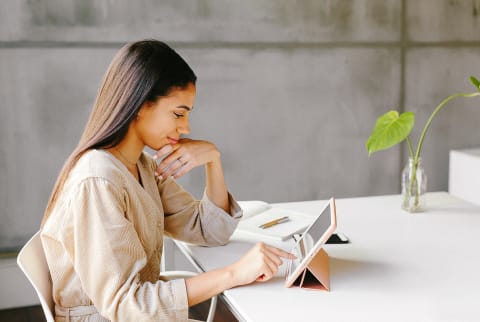Cutting Screen Time By 30 Minutes A Day May Ease Anxiety & Loneliness


Screen time is top of mind for many people, hence why there are so many apps and programs to help you monitor it nowadays. But while the perks of putting the phone down are fairly well-known, the exact amount of time you should limit yourself to is still pretty vague. Luckily, a new research study found success with quite a simple switch.
Cutting screen time by 30 minutes benefits mental health
A recent experimental study published in the Technology, Mind, and Behavior journal found that cutting down screen time by 30 minutes each day via self-monitoring social media usage improved psychological well-being.
Researchers at Iowa State University elected 230 undergraduate students to two groups: One group was instructed to limit their social media use by 30 minutes each day, and the other continued using social media as normal.
The positive mental health impact specifically included decreased feelings of anxiety, depression, loneliness, and fear of missing out—a pretty big win for such a small change.
Now, this may not be immediately surprising, but the study suggests something important: You don't have to fully cut out social media to feel the benefits. Even just 30 minutes a day for two weeks can have a major positive effect on mental health.
Also of significance is the fact that this study was a self-monitoring study. In other social media research, similar experiments are often conducted where researchers administer the monitoring, taking the responsibility out of the hands of users. But this method is more realistic and actionable, especially for folks just starting out on the mindful tech journey.
Of course, the positive effects of limiting social media will vary for every person depending on their current screen time use and habits, what they replace that time with, and underlying mental health struggles. Still, it's a finding worth noting.
Summary
How to limit your social media use
All of that being said, it's not easy to cut down your social media use at first. Keep the following tips and tools in mind to help you get started:
- Create phone-free zones: One of the easiest ways to significantly limit social media use is to decide where you'll go phone-free. This could be your bedroom, your office, when you're with other people, etc. If there are fewer locations you can be on your phone, then it'll automatically cut down your screen time.
- Make a schedule: Another way to do this is by limiting the time of day you spend on your phone. You could go phone-free for the first and last hour of the day, keep your social media use between noon and 5 p.m., or any other schedule that works for you. To make this one more effective, try to limit yourself in times when you tend to scroll the most—before bed, first thing in the morning, on your lunch break, etc.
- Delete apps: If you find yourself jumping from app to app, then it may be a good idea to delete one of them to start. Go with the app that brings you the least amount of joy and connection or an app you only use to fill time.
- Use screen time tools: Finally, use tools that you have access to. Many phones have screen time limit functions where you can customize your time "allowed" on a given app each day. Once your 20 minutes of Instagram is up, you'll have to click through a "Give me more time"-type of function to gain access to the app. While this won't work for everyone, it can help you be a bit more mindful about your social media consumption.
Other than that, just do your best to check in with yourself and take note of social media habits that make you feel lonely, insecure, anxious, or upset.
From there, limit what you can and fill your extra time doing things you love. It won't be easy at first, but neither are many healthy habits. Don't worry, it'll get easier and easier every day.
The takeaway
A new study found that limiting screen time by 30 minutes each day via self-monitoring for two weeks decreases feelings of anxiety, depression, fear of missing out, and loneliness. If you want to try limiting social media but don't know where to start, this may be a helpful method. You may feel bored at first, so here's a long list of solo activities that benefit your mental health to help you fill your time.